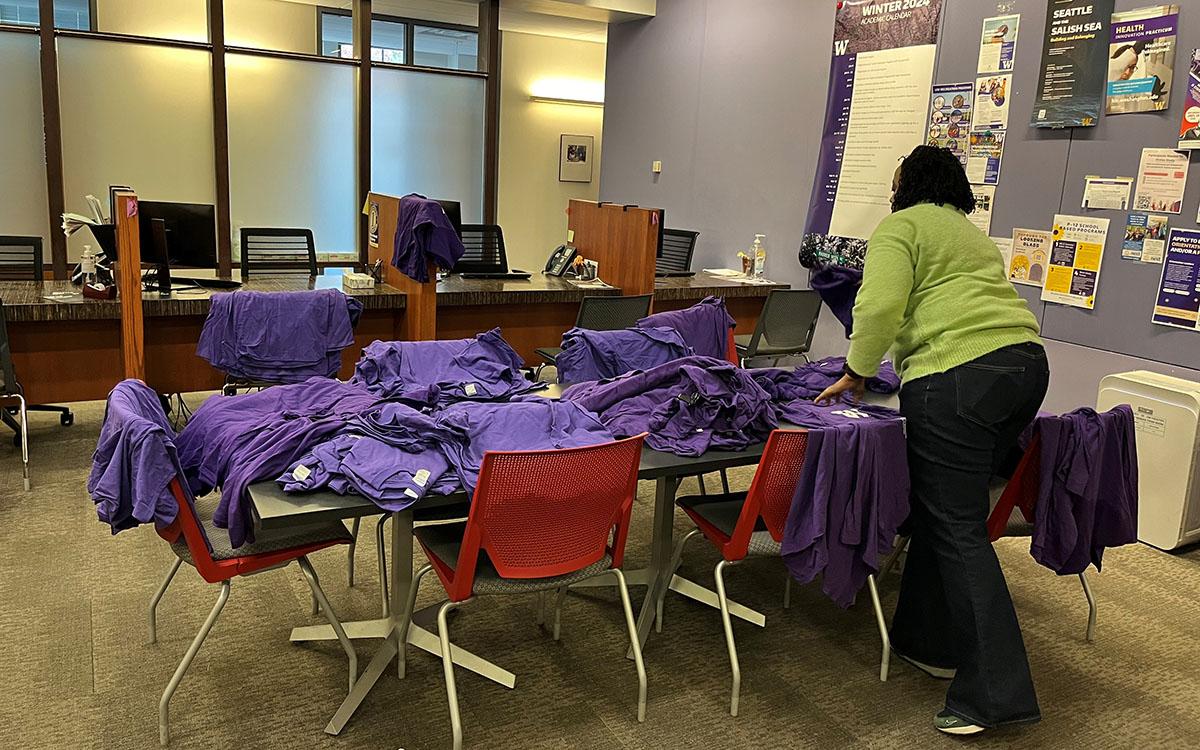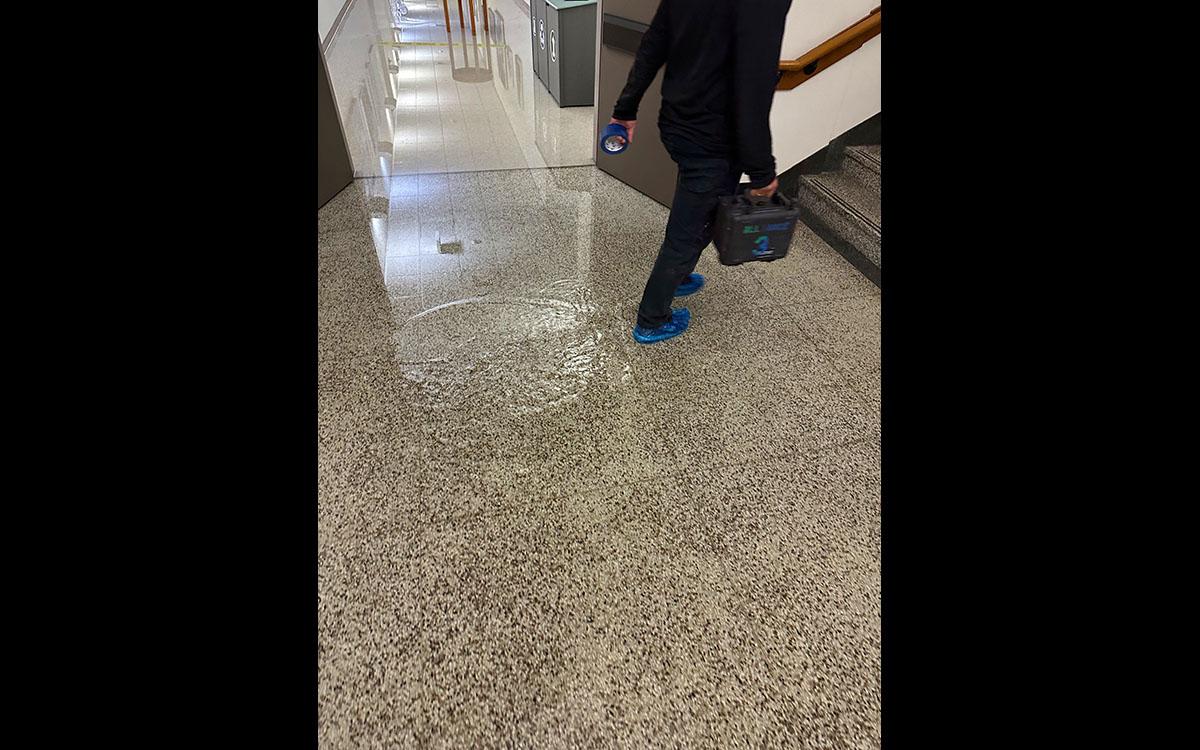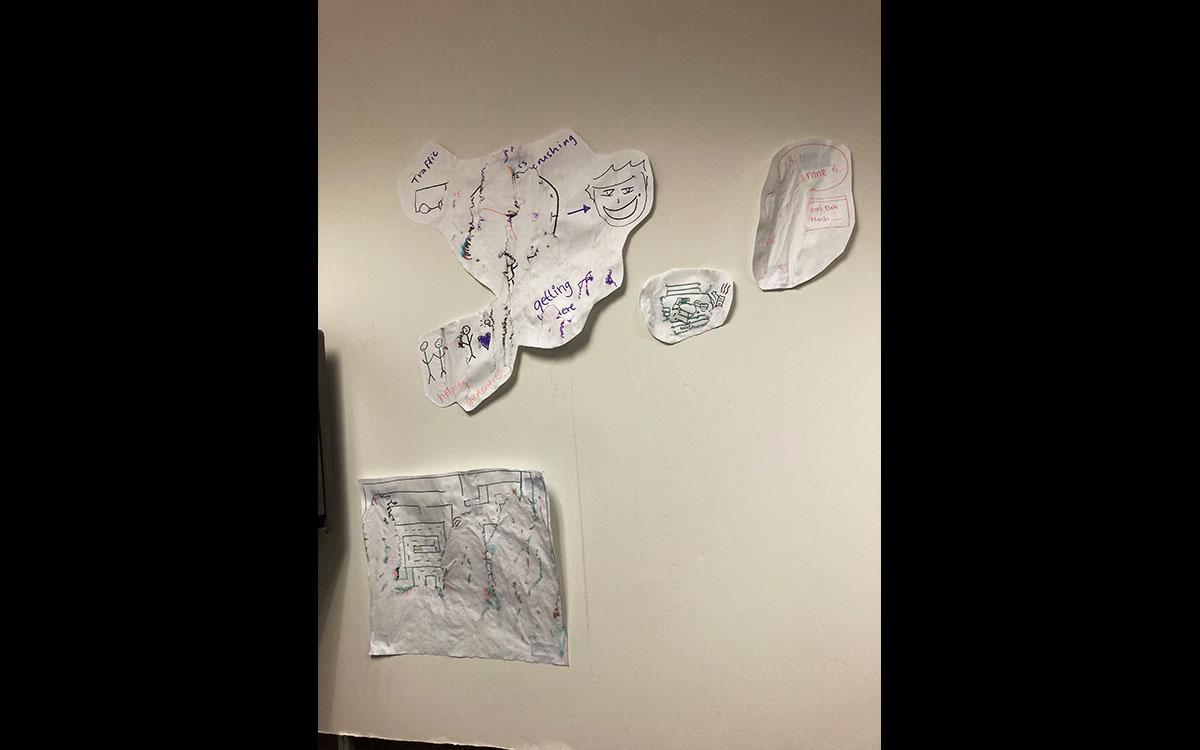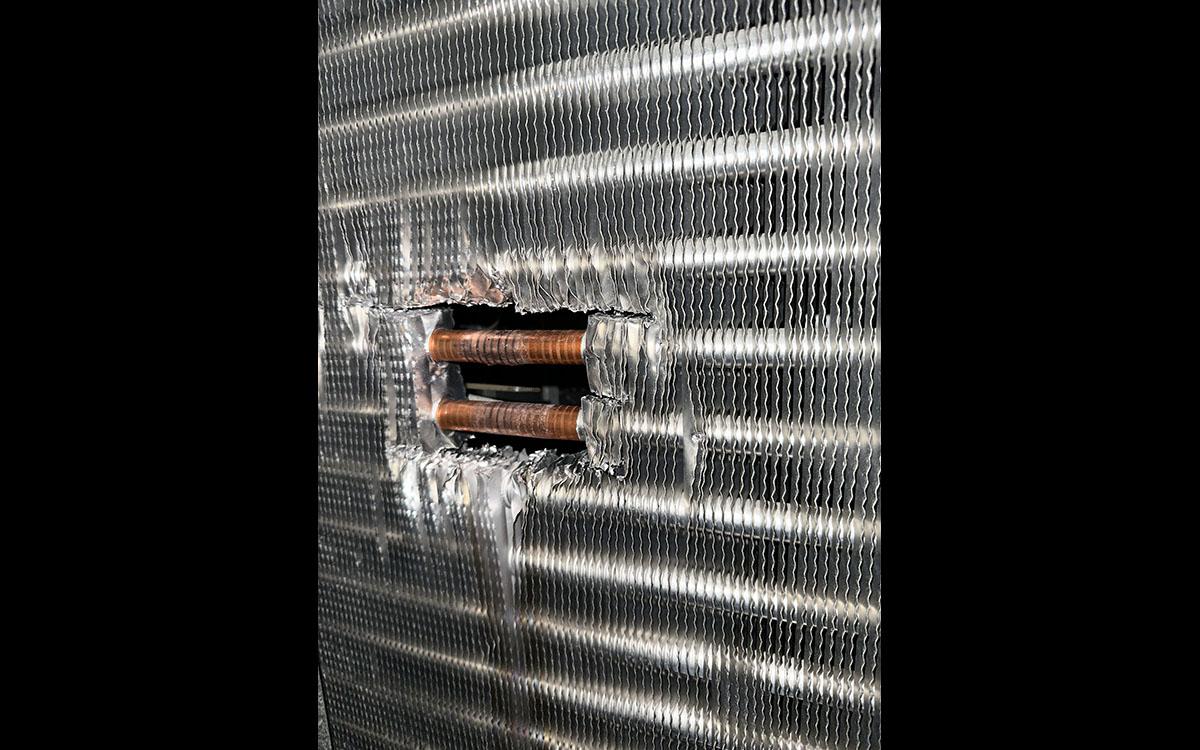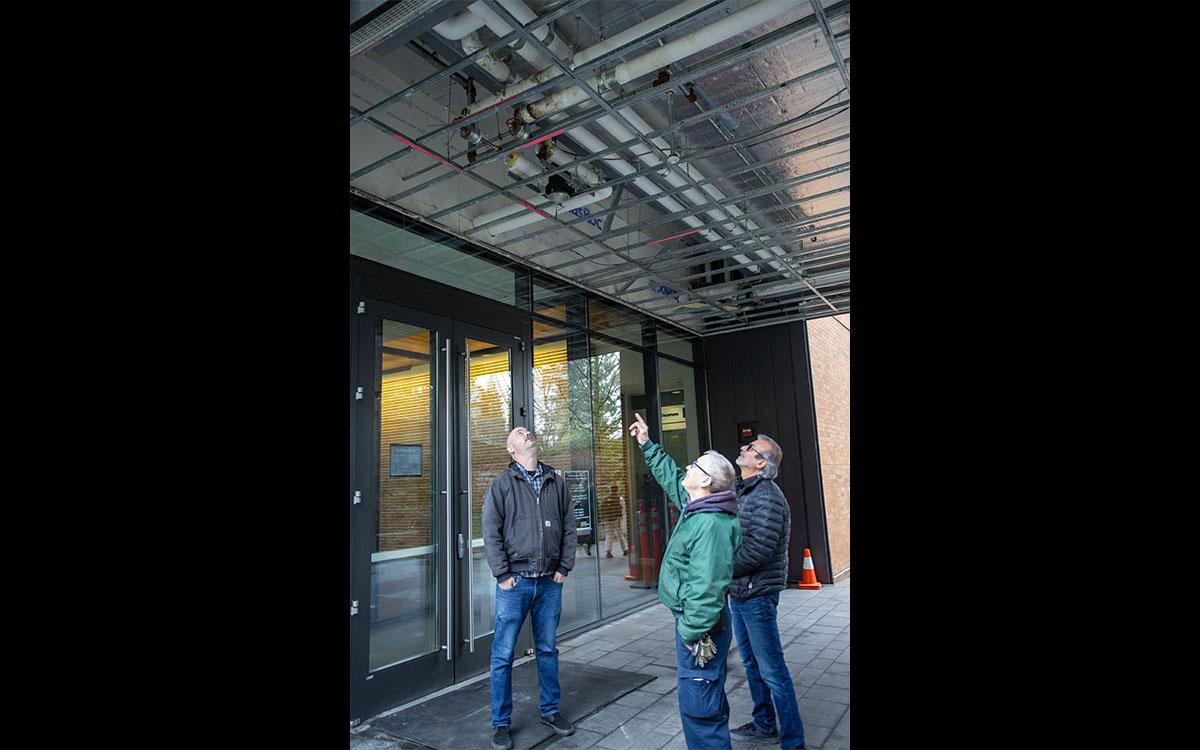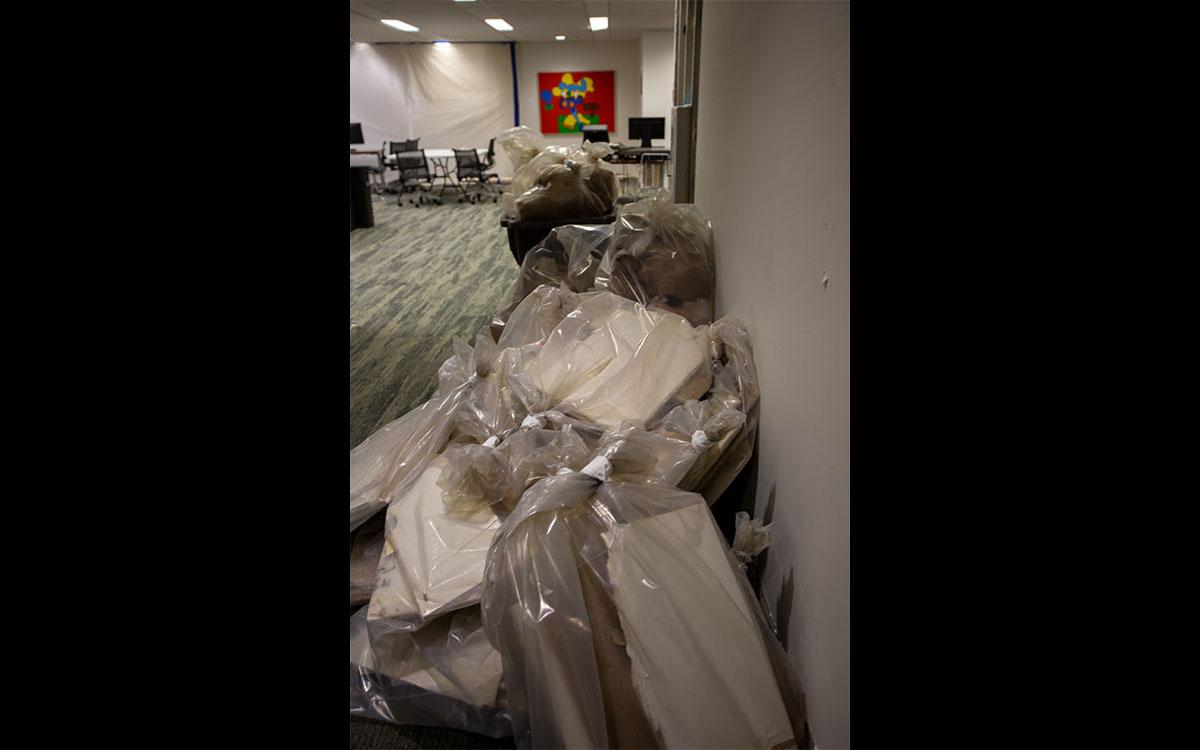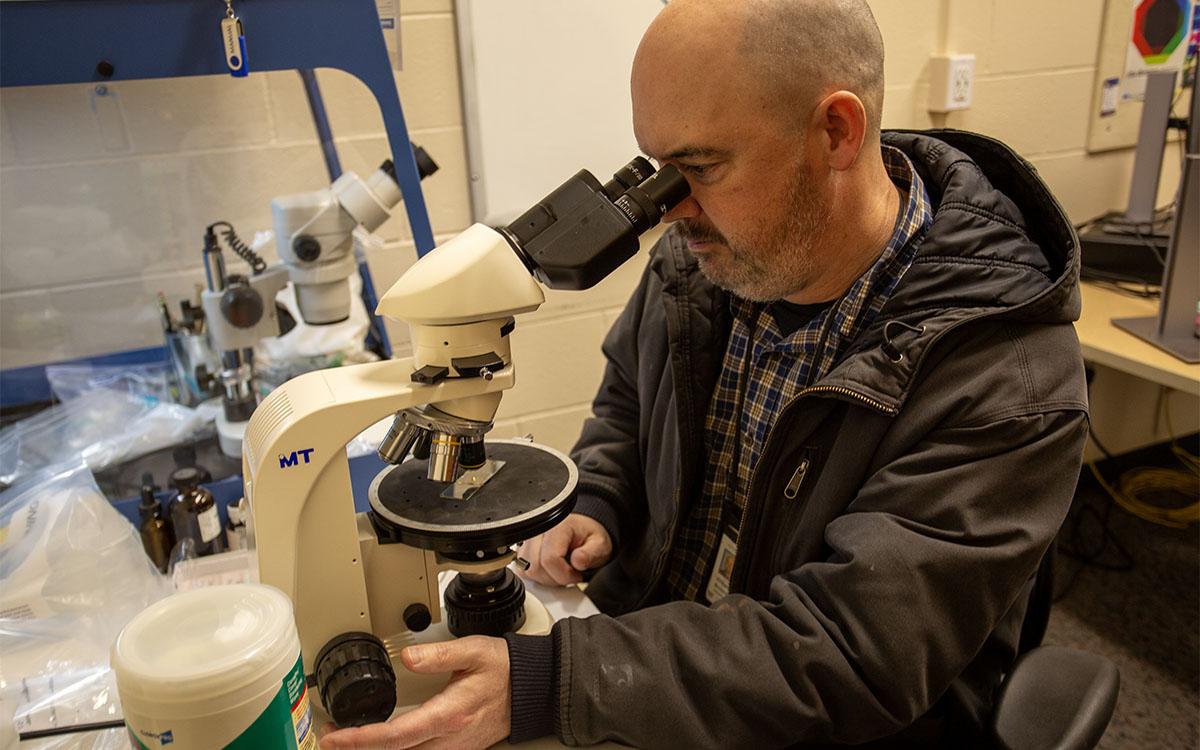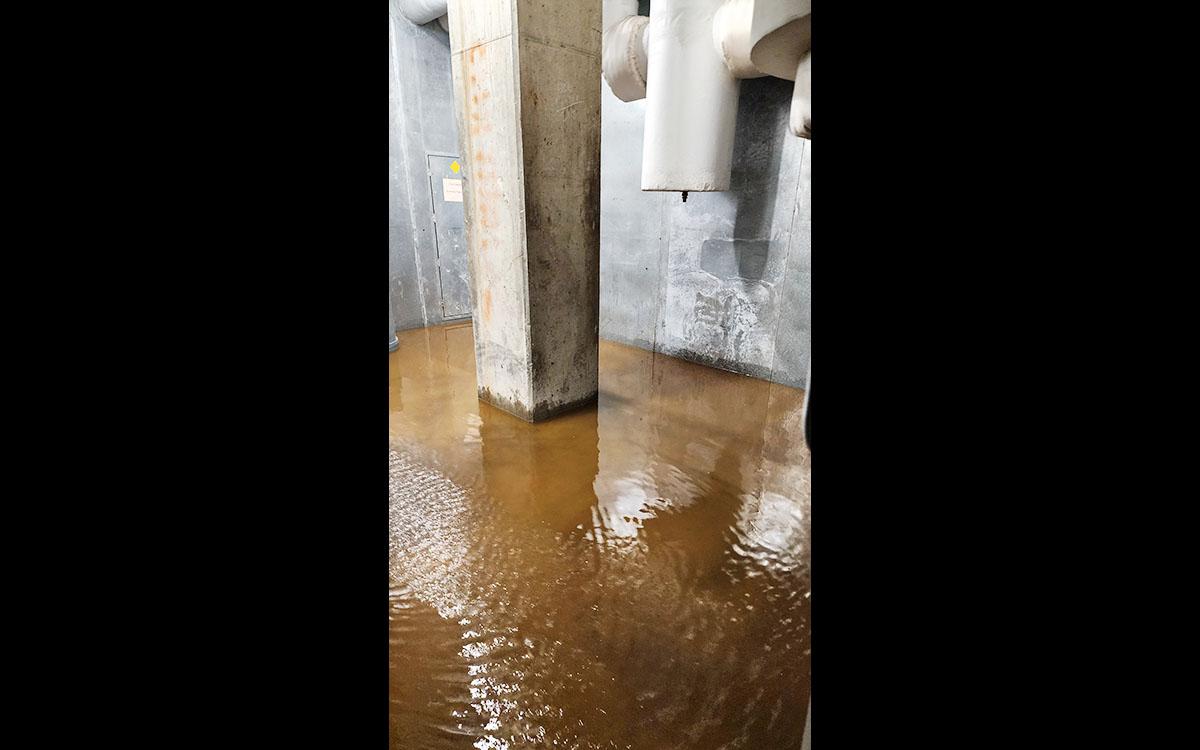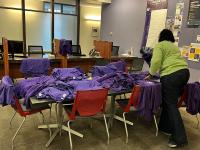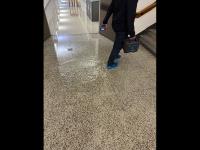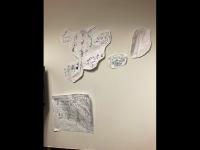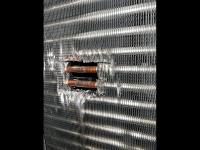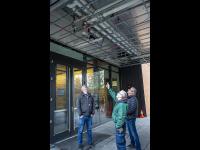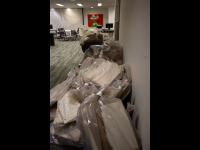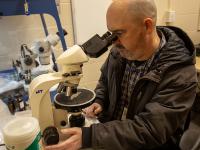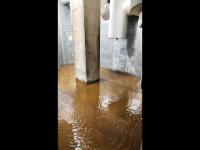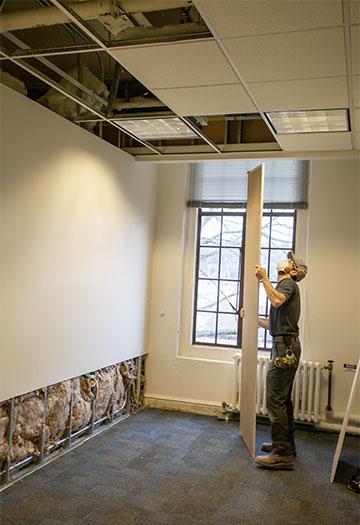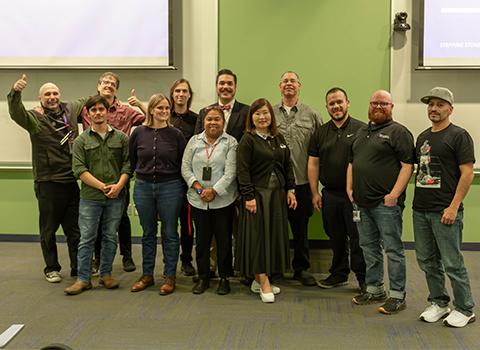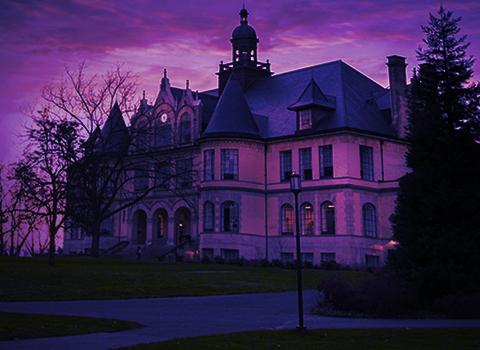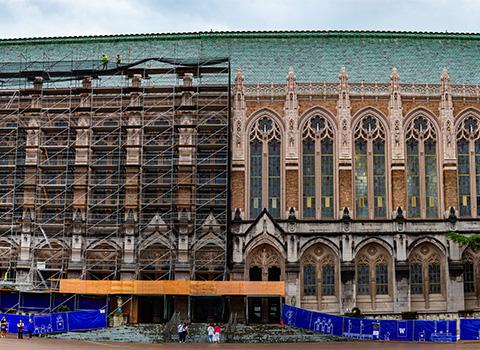UW Facilities fights campus floods
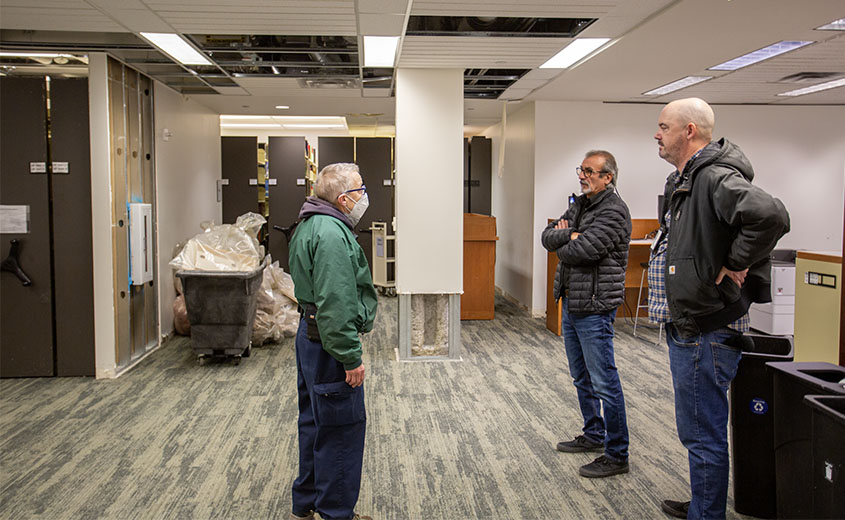
Plumber Paula Lukaszek discusses flood damage with Saeid Rastegar and Russell Browne, part of the Regulated Materials Office, in Foster Business Library. A burst pipe in the breezeway between PACCAR and Dempsey Halls caused water to leak into the library. Misty Shock Rule
Late Friday afternoon before Martin Luther King, Jr. weekend, Jodene Davis returned to her office in Mary Gates Hall, where she works as a director in Undergraduate Academic Affairs. Her colleagues pointed to the ceiling in the hall of their ground-floor suite. Water was coming out of the tiles, making its way down the wall and out the bottom of a doorframe.
She went to investigate, thinking it was a leak from a bathroom. On the second-floor landing, she found a "growing lake" fed by water coming down the walls and stairs. On the third floor, she put her ear to the wall. “It sounded like someone was taking a shower,” she said.
Later that night, Josh Estes was working his shift as a lead operating engineer at the UW Power Plant. He monitors the system that heats and cools campus by distributing chilled water to buildings through UW’s tunnels. When he started his shift, he noticed a dip in one of the readings measuring system pressure, but it immediately recovered.
At 1:50 a.m., the reading dropped again, but it was a more significant drop and lasted much longer. System pressure eventually fell to almost zero. The tank that holds the water for the system had been emptied.
That Friday and over the weekend, the Puget Sound region saw temperatures in the 20s that dipped into the teens overnight, the coldest temperatures in decades. The freeze led to dozens of leaks — and some floods — across the UW campus, as pipes and coils cracked and burst.
“It was just way too cold,” said plumber Paula Lukaszek, who said she’s never seen so many leaks in her 20 years working at the UW. “We’re not used to sustained cold like this. Our piping wasn’t built for this kind of weather.”
Calling UW Facilities’ first responders
Calling UW Facilities’ first responders
When there is an emergency issue involving facilities on campus, staff known as Facilities Operations Maintenance Specialists (FOMS), or by their radio name, Unit 2, are the first to respond. Available 24/7, 365 days a year, FOMS are the superstar generalists of UW Facilities (UWF). They have to know all campus buildings and all building systems, such as refrigeration, electrical, plumbing and more.
When FOMS arrived at Mary Gates that Friday, they went through their normal triaging process: find the source of the leak, isolate it, and then fix the problem or call for help. They discovered that the leak was coming from the mechanical room on the fourth floor, later revealed to be caused by a burst heating coil.
FOMS then called the Regulated Materials Office (RMO), a team also available 24/7 when there are leaks or damaged building materials. RMO provides services related to mold, asbestos, lead, chemicals, biological contaminants and more. It’s led by Saeid Rastegar, who is known to go to extreme lengths to protect UW property from flood damage. RMO’s team of industrial hygienists helps with clean up and mitigation, with the assistance of term abatement contractors.
Any time staff find a leak they call Rastegar, who knows which buildings hold risk of exposure to asbestos and when it is safe to clean up. At Mary Gates, Rastegar gave the okay for FOMS to look at damage above the ceiling because there was no asbestos risk. He then called in the RMO term contractor and one of the team’s industrial hygienists to help.
Back at the Power Plant early Saturday, Estes knew the empty tank was caused by a big leak. Staff across UWF’s Maintenance & Construction team were called and started arriving around 4 a.m. They searched dozens of buildings for the leak, a process that FOMS manager Tyler Quandt compared to looking for a “needle in a haystack.”
At about 7:30 a.m., staff found the cause of the loss of water at the Power Plant. It was a burst coil in K Wing of the Health Sciences complex.
Things heat up
Things heat up
As the three-day MLK weekend went on, temperatures rose slightly, reaching the mid 30s on Sunday and the high 30s on Monday. That’s when things got even busier for UWF.
“A lot of times you won't know [about problems] until it thaws out,” said Jeff Kopec, a maintenance supervisor covering UW’s central campus. “It freezes and then water warms up — that's when the leak actually occurs. By then, the damage has been done.”
On Sunday in the Oceanography building, a water heater burst on the third floor, flooding eight offices below. Maintenance staff removed 40 ceiling tiles that had been saturated, some disintegrating into gloopy piles on top of desks and chairs. Staff rushed to place plastic over research in a neighboring office and simulation tanks in the basement.
Sprinklers also burst, requiring the attention of UWF’s fire protection team and causing large floods in the Don James Center at Husky Stadium and Blakeley Village. On Monday, FOMS Darryl Milus was helping someone in the K Wing of Health Sciences when the fire alarm went off. There was a sprinkler leak in the mechanical room in the basement. When he got there, he found water up to his knees.
The leaks touched every corner of campus, with floods in UW Tower, Fisheries Teaching and Research Center, and more. Some didn’t require people to come in right away. At first, Lukaszek, the plumber, fielded calls from home, telling FOMS where to go to shut off water.
Then, FOMS called her at 5:30 p.m. on Monday about flooding in the breezeway between PACCAR and Dempsey Halls. Water was seeping below into the Foster Business Library. When she got there, FOMS was “running around like crazy” from all the calls they were getting.
She worked until midnight and then found herself “too tired to drive home.” She said, “I could drink some coffee to stay awake but then I wouldn't fall asleep and be back the next day. So I just figured it was easier to sleep in the woman's locker room. I had a blanket in the car, so I grabbed that."
After the flooding was under control, repairs and the work of getting people back in their offices began. Carpenters and other maintenance staff cut out and replaced drywall. They sometimes found mold, which required more assistance from RMO. The team has a lab and sophisticated equipment to measure air quality, identify asbestos and more.
Davis, the director working in Mary Gates Hall, got updates every step of the way — from FOMS, RMO and maintenance staff working on repairs.
“It just felt like everybody wanted to take care of the building and get ready for other issues on campus that were bound to arise with the freezing temperatures,” she said.
“All of the involved shops and staff from Facilities worked quickly and seamlessly to repair our offices. We are very grateful for the attention and care from everyone.”
All hands on deck
All hands on deck
In all, 150,000 gallons of water were lost from the tanks in the Power Plant, spilling into campus buildings. And dozens of staff — FOMS, industrial hygienists, plumbers, mechanics, custodians, fire protection staff, HVAC specialists and more — came in during their off hours or worked past their normal shifts.
The events of the weekend showcased the commitment of staff as they worked to protect UW property, even if it meant stepping outside their normal way of working.
“We all work at UW, right? So call us in if there's any issue. I'm good to work in any zone," said plumber Chris Heinrichsen, who normally works in central campus but helped in the southwest zone that weekend.
Electrician Jake Webster was called in to ensure there weren’t any electrical hazards. He said, “We get into these kinds of situations where everybody's in a scramble and saying, 'Okay, we got to figure all this stuff out,’ — whether it's pushing a broom or doing something else.”
For many, the frenzy is part of the job.
“It comes with the territory,” said Wayne Johnson, a maintenance supervisor covering the Health Sciences complex. “It’s not an eight-hour job. In our world, we get called all the time. When I go to bed at night, I don’t turn my phone off. I anticipate a call.”
UWF staff are already thinking about ways to prevent flood damage next time there’s a cold snap. Possible solutions include water sensors, which RMO is starting to use in stage 2 of a Water Response pilot program, and increased staffing when freezing temperatures are predicted.
Preparation helped them get through this cold snap, and it will help in the future, said Estes, the Power Plant engineer.
“The benefits of Facilities is that we’re ready for the unexpected by being prepared,” he said. “We get a lot of things that happen maybe once every couple of decades. You just acclimate and you work together to find a solution. And in this case, we did it and we learned and we're better prepared for the next ice storm that comes through."
